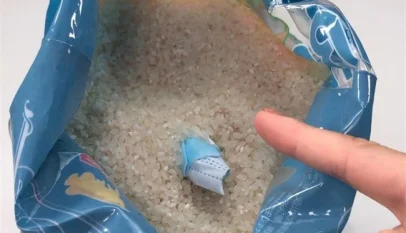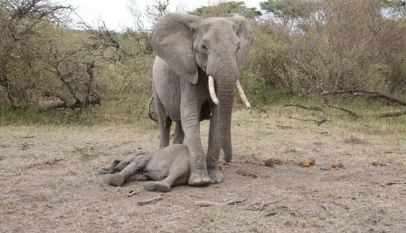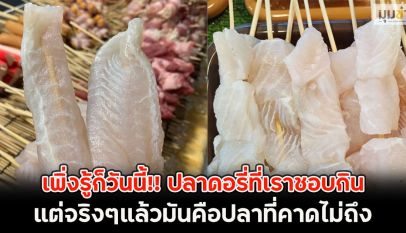
🐘 The Baby Elephant Who Refused to Give Up
The sun blazed mercilessly over the cracked earth.
The air shimmered with heat.
And lying motionless beneath that burning sky was a tiny elephant calf — its skin dry and wrinkled, its breath shallow, its eyes closed.
For hours, it had struggled alone in the dust, the last bit of strength fading from its small body.
When the rescue team found it, the calf was barely alive.
At first, they thought it was too late.
It looked abandoned — forgotten by its herd, left behind in a landscape where drought had stolen every drop of life.
The riverbeds were dry, the grass brittle, and the animals desperate.
But then — a faint movement.
A twitch of the ear.
A breath.
There was still hope. 💔

💧 A Fight Against Time
The rescuers rushed to work.
They poured water over the calf’s parched skin to cool its body and shielded it with blankets to block the relentless sun.
One ranger knelt beside it, whispering softly, “Stay with us, little one. Don’t give up.”
A large jug of IV fluids was prepared, and a needle carefully inserted into the calf’s leg.
Slowly, drop by drop, life began to return.
The baby stirred — eyes fluttering open for the first time.
A soft, broken cry escaped its throat.
It was weak, frightened, but alive.
The rescuers named it Amari, meaning “strength” in Swahili.

🏜️ The Shadow of Drought
The drought had been brutal.
For months, rain hadn’t touched the land.
Waterholes had turned to dust, and herds wandered for miles in search of something — anything — to drink.
Many elephants had perished, trapped between hunger and heat.
Some herds had been forced to move deeper into human settlements, searching for water and food — risking conflict, risking loss.
Amari’s family had likely faced that same impossible choice.
Perhaps the herd had moved too far, leaving the weakened calf behind when it could no longer stand.
It wasn’t abandonment — it was survival.
🩺 Hope in Human Hands
Amari was transported to a nearby wildlife rehabilitation center, still too weak to stand.
Veterinarians worked through the night, rehydrating and monitoring its fragile heartbeat.
Its small trunk twitched weakly as if searching for the mother it couldn’t find.
The next morning, when the first rays of dawn touched the horizon, something miraculous happened.
Amari lifted its head.
A caretaker hurried to its side, holding a bucket of milk and water.
The baby hesitated, then reached out — wrapping its tiny trunk around the bucket and drinking greedily.
Cheers erupted through the camp.
It wasn’t just a drink.
It was the first sign of life returning.
🌿 Learning to Stand Again
Over the following days, Amari’s strength began to grow.
Caregivers massaged its legs to restore circulation and supported it with straps as it tried to stand.
Each attempt ended in wobbles and tumbles, but no one gave up — least of all Amari.
Then, on the fifth morning, as the sun rose over the dry plains, the little elephant stood on its own.
Unsteady, trembling — but standing.
A cheer went up from the rescuers.
Tears glistened in their eyes as Amari took a small step forward.
It was a step toward survival.
A step toward hope.
💛 Finding Family Again
Elephants are deeply social creatures — they need their herd, their family, their sense of belonging.
Amari began bonding with two older orphaned elephants at the center, who had also lost their families to drought and conflict.
They would nudge and rumble to each other, their trunks intertwined like hands.
For Amari, it was healing — not just of the body, but of the heart.
Caretakers noticed how quickly it adapted — splashing in water tubs, trumpeting softly at sunrise, and following its new friends around the compound.
Each day, the spark in its eyes grew brighter.
🌧️ When the Rains Returned
Months passed.
The drought slowly loosened its grip.
Clouds began to gather — heavy and gray — and when the first raindrops fell, the entire sanctuary came alive.
Amari lifted its trunk to the sky, trumpeting with joy.
For the first time in its short life, it felt the cool touch of rain.
It danced clumsily in the mud, its ears flapping, as if celebrating its own rebirth.
The rescuers watched in silence, smiling through tears.
They knew that one day, Amari would walk free again — strong, fearless, and whole.
🕊️ The Meaning of Survival
Amari’s story spread across the world — a small elephant who had refused to die beneath a cruel sun.
People sent donations, letters, and prayers.
Children drew pictures of the brave baby elephant who lived.
And to those who saved it, Amari became a symbol — of resilience, of love, and of the quiet strength found even in the smallest hearts.
Because sometimes, survival isn’t loud or heroic.
Sometimes, it’s a heartbeat that refuses to stop.
A trunk reaching for water.
A whisper in the heat that says, not yet.
🌅 A New Dawn
Today, Amari roams safely with other rescued elephants, learning to forage, play, and trust again.
One day, when it’s strong enough, it will return to the wild — to the land that once nearly took its life, but also taught it how to live.
And when it does, the wind will carry its story — of drought, of struggle, and of one baby elephant who refused to give up. 🐘💛






